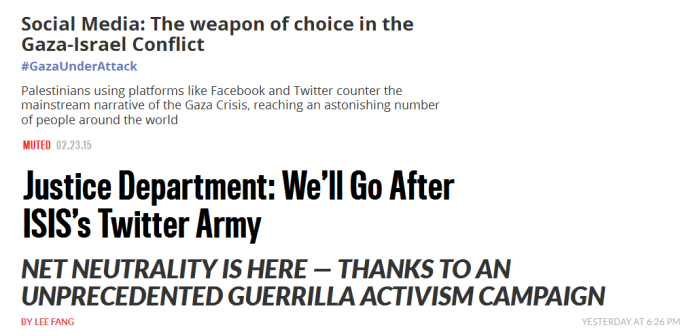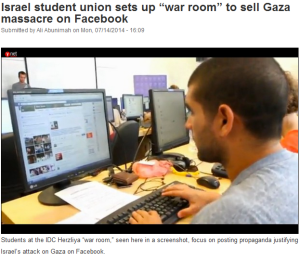
Any honest observer of contemporary activist struggles would be remiss to ignore the substantial influence of social media in bringing together disparate groups struggling to achieve a common goal. Contributions of social media activism to political discourse are numerous from gruesome images filtering out of occupied territories to raw footage of militarized police brutalizing nonviolent protestors. Undoubtedly, political agitation cannot be confined to the physical realm. Mass movements crucially depend on the rapid circulation of information and images, which, more often than not, occurs in cyberspace.
The social media activism that accompanied Israel’s seven week assault on the Gaza Strip offers a paradigmatic illustration of the central role Internet users play in galvanizing mass support for marginalized populations. As journalist Yousef al-Helou stated in his assessment of the impact of social media websites like Facebook and Twitter in generating support for Palestinians fleeing in terror under Israeli bombs:
“Citizen journalism from Palestine is especially valuable for those who are looking for information which has not been filtered through a Western agenda. Social media has definitely weakened the Israeli narrative, as Palestinians are able to connect directly with overseas audiences and tell the stories that they feel are important. Hundreds of thousands of tweets exchanged reports, opinions, and challenges to mainstream news reports and to each other.”
This adversarial spirit—the willingness to present “challenges to mainstream news reports”—is a thread that unites several of the most prominent social media campaigns and is reflective of the public’s desire to move away from the highly corporatized and anti-septic discourse of the establishment press toward more non-mediated and participatory forms of information sharing.
Not unlike other trends toward democratization, this blossoming in social media activism has elicited a fair amount of criticism from centers of privilege and power. Perhaps the most recent iteration of this elite backlash can be found in an article published in New York Magazine by former New Republic journalist Jonathan Chait. Decrying the rise of political correctness, a “system of left-wing ideological repression”, Chait targets social media and its broad influence as culpable in spreading this virus:
“Political correctness is a style of politics in which the more radical members of the left attempt to regulate political discourse by defining opposing views as bigoted and illegitimate. Two decades ago, the only communities where the left could exert such hegemonic control lay within academia, which gave it an influence on intellectual life far out of proportion to its numeric size. Today’s political correctness flourishes most consequentially on social media, where it enjoys a frisson of cool and vast new cultural reach. And since social media is also now the milieu that hosts most political debate, the new p.c. has attained an influence over mainstream journalism and commentary beyond that of the old.”
Echoing such establishment manifestos like the Powell Memo, which infamously denounced the failure of “institutions responsible for the indoctrination of the young” (schools), Chait’s criticism conveys a palpable sense of alarm, a fear that the hallowed corridors of “respectable” discourse are being intruded upon by less qualified and less enlightened commoners. Fundamentally, Chait’s article conveyed, as Glenn Greenwald put it in a stinging critique, “anger over being criticized in less than civil and respectful tones by people who lack any credentials (and thus entitlement) to do so.” This is a sentiment that is as pernicious as it is pervasive and the elite response to social media activism is just one of its more visceral manifestations.

Incidentally, similar objectives to stem the tide of social activism’s “vast cultural reach” likely lay behind the concerted efforts on the part of the telecommunications industry to eliminate net neutrality, a campaign that was recently dealt a devastating defeat thanks to a grassroots movement of “guerrilla activism”, much of it online, dedicated to preserving the “the principle that all Internet traffic must be treated equally.” Responding to the FCC’s decision to uphold these basic rules of net neutrality, the campaign director of Free Press stated “this is probably the most important ruling in the history of the FCC.” In these hard-won achievements we can discern the significance of social media, not only as a virtual public square where dialogue and reflection on some of the most important issues of our time can flourish, but as a space whose mere existence constitutes a grave threat to those whose power relies on the erasure of these sites of democratic expression (the National Security Agency’s regime of electronic surveillance, a legal monstrosity hauntingly portrayed in Laura Poitra’s award winning documentary CitizenFour, is one of the more obvious opponents of Internet freedom in this respect.)
 Understandably, this is why “companies such as Comcast, Verizon, AT&T and Time Warner Cable, had lobbied furiously against [net neutrality], spending tens of millions on lobbying and on so-called ‘astroturf’ efforts to pay third party groups to support their position.” Faced with the inability to manage the formation attitudes and opinion online, power systems have pursued the same tactic applied to the print media, namely exercising stricter control over the medium. Sometimes this control rises to the level of law enforcement, as the Obama DOJ made clear in a recent announcement that they would be “willing to indict people who assist ISIS with its use and production of social media”, a decision that “raises questions about where the government would draw the line between support for a terrorist group and legally protected free speech.” Indeed, if pro-ISIS propaganda is criminalized why not criminalize other forms of propaganda?
Understandably, this is why “companies such as Comcast, Verizon, AT&T and Time Warner Cable, had lobbied furiously against [net neutrality], spending tens of millions on lobbying and on so-called ‘astroturf’ efforts to pay third party groups to support their position.” Faced with the inability to manage the formation attitudes and opinion online, power systems have pursued the same tactic applied to the print media, namely exercising stricter control over the medium. Sometimes this control rises to the level of law enforcement, as the Obama DOJ made clear in a recent announcement that they would be “willing to indict people who assist ISIS with its use and production of social media”, a decision that “raises questions about where the government would draw the line between support for a terrorist group and legally protected free speech.” Indeed, if pro-ISIS propaganda is criminalized why not criminalize other forms of propaganda?
For example, why not criminalize the Facebook administrators who created a fan page for Chapel Hill murderer Craig Stephen Hicks? In fact, if we accept that issuing indictments in response to social media propaganda is the proper course of action (one would hope we don’t) then it probably would be more reasonable to indict these propagandists since gun related killings committed by non-Muslims vastly outnumber deaths associated with so-called Islamic terrorism. Or why not indict US citizens who regurgitated Israeli hasbara manufactured in IDC Herzliya “war rooms”? How was this not apologetics for terrorism? Naturally, certain forms of propaganda, namely those types which conform to elite US opinion, will pass under the DOJ’s radar more easily than other “anti-American” forms. Consequently, this decision risks converting policies with the ostensible purpose of combating “terrorism” into effective weapons against political opponents (terrorist or not).
Whether it’s a battle for Internet freedom, the publication of humanizing representations of Palestinians or the fight for social and governmental policies that affirm the urgent, inspirational demand that #BlackLivesMatter, it’s abundantly clear that the struggles currently underway cannot be reduced to petty ideological contests waged from the safety of our computers. To the contrary, these struggles raise profoundly consequential questions about the social, cultural, and political evolution of not only our society but, when one considers the unprecedented forms of solidarity that social media activism is able to foster, the fate of us all globally.
Source:
http://www.middleeasteye.net/news/social-media-weapon-choice-gaza-israel-conflict-1807202428
http://nymag.com/daily/intelligencer/2015/01/not-a-very-pc-thing-to-say.html
https://firstlook.org/theintercept/2015/01/28/petulant-entitlement-syndrome-journalists/









